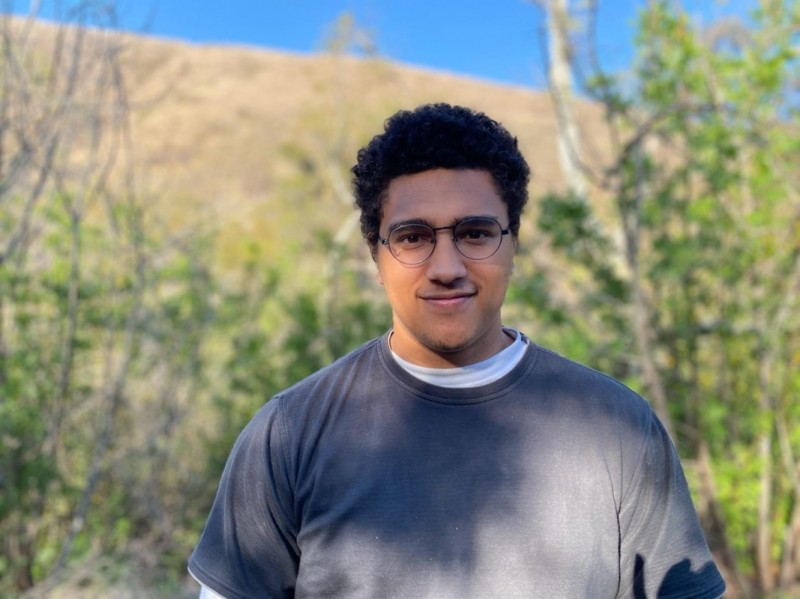A fellowship helps Ian Cooper-Smith chart his future in history

The Civil War ended more than 150 years ago, but it continues to shape American culture and politics. At its heart is perhaps an essential question: Who does the United States include in “we the people,” the words that begin the preamble to the Constitution?
Questions like these fascinate Ian Cooper-Smith. A senior graduating this May, Cooper-Smith is a history major with a focus on 19th- and 20th-century U.S. politico-military history, as well as the historical intersectionality between class, race and gender.
“I have always been fascinated by how America imagines itself, conceived in liberty and equality, juxtaposed against the reality and pervasiveness of white supremacy and systematic racism,” he said.
He first became fascinated by history in middle school, reading books about the Civil War and World War II and avidly watching the History Channel “before it was only reduced to Pawn Stars and Ancient Aliens,” he quipped.
Recently, he has been drawn to explore the intersections between class and race, particularly the ways in which white supremacy has been used to perpetuate socioeconomic hierarchy and prevent solidarity between Black and white working-class communities in the South after the Civil War. The Reconstruction period and its failures have left an impact on our nation’s politics, educational institutions and power structures that can be felt to this day, he said.
“It is difficult to convey just how consequential Reconstruction was to the development of American race relations,” he said.
This spring, Cooper-Smith was accepted into the Catto-Lecount Fellows Program for Equity and Inclusion, which is sponsored by the George and Ann Richards Civil War Era Center at Pennsylvania State University. The program is geared toward students of color interested in pursuing their doctorates in history, with useful information about how to select programs, navigate the application process and embark on careers in the field.
He learned about the program through history Professor Diane Miller Sommerville, who encouraged him to apply.
The fellowship, which Cooper-Smith attended with 13 other students of color, was held online due to the coronavirus pandemic. Speakers ranged from the head of Penn State’s History Department to graduate students and professors specializing in Afro-American studies; women’s, gender and sexuality studies; and Latina/o studies, who demystified PhD history programs and the graduate school process in general.
They also led discussions about identifying as scholars and not shying away from using their experience as Black, indigenous and people of color (BIPOC) to inform their research, he said.
Cooper-Smith’s career interests have shifted through the years. In high school, he considered becoming a museum curator, he remembered. The fellowship has helped him identify and refine his goals.
“I’ve come to realize that pursuing a PhD and dedicating myself as a historian to research that addresses a legacy of economic exploitation and systemic and institutional disenfranchisement in federal and local contexts is one of the best ways to bring about cultural and structural change,” he said.
His Binghamton experience
Originally from Westchester County, Cooper-Smith chose Binghamton based on the strength of its History Department, as well as the University’s reputation as an affordable “public Ivy.”
Currently, most of his research is driven by his classes. For a paper on inter-ethnic Southeast Asian interactions in French colonial Indochina, for example, he collected documents from the French imperial perspective written by colonial administrators, which he then cross-referenced with contemporary and more socially conscious secondary sources.
“Most of my research has been strictly digital, but I’d love to explore local databases and documents across the country,” he said.
During his time at Binghamton, Cooper-Smith has taken classes in the history of imperialism, social justice, gender and minorities. His foundation in the history of oppressed peoples is among the best Sommerville has encountered among undergraduates in her 14 years at Binghamton, she said.
While informed by current events, he relies on a historian’s methods and analytical tools to an extent rare in undergraduates. His intellectual gifts leave him well-suited for a top graduate history program, according to Sommerville,
“He is interested in uncovering our nation’s past history of racial injustice and violence and making connections to larger systemic and institutional arcs that are visible today. My sense is that Ian recognizes that the path to true social and political reform in our nation lies in understanding the links to the past,” Sommerville said. “He is therefore considering a career that will allow him to dive deeper into that history and, through his own research projects and teaching, will contribute to that weighty agenda.”
For his part, Cooper-Smith found both inspiration and support in his professors. In the African Student Organization and the Black Student Union, he also discovered a sense of community and a safe space for honest and profound discussions, he said.
“From the bottom of my heart, I feel the History Department is nothing short of extraordinary. Every professor I’ve had the pleasure of knowing has encouraged me and other students to add nuance to our studies, think critically, and interrogate the status quo and production of knowledge,” he said. “I’ve had a great time at Binghamton and I’m very happy with the choice I made.”

